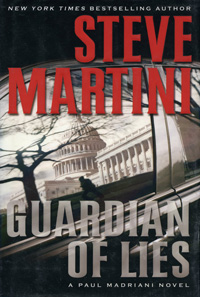
Legal Thriller? Courtroom Drama?
Just finished reading Guardian of Lies by Steve Martini. I chose the book because I am a fan of Martini’s writing and of Paul Madriani, the lawyer who is featured in many of Martini’s books. I am trying to think just what it is that made me dislike the book even though I could not turn the pages fast enough all the way to the very end of the book.
In Guardian of Lies, Madriani’s client is Katia, a beautiful young Costa Rican woman who is accused of a double murder in a quiet mansion in Southern California. In fact, we know from the beginning that the crime was perpetrated by a Mexican hit man, hired by a Middle Eastern terrorist, an escapee from Guantanomo Prison. In fact, Katia was to have been one of those murdered because, unknown to her, she possesses evidence of a terrorist plot. The only way to prove Katia’s innocence is to recover the evidence, several digital photographs. This leads Madriani (and his PI Herman Diggs) to San Jose, Costa Rica, to the port of Ensenada, Mexico, and to the final dramatic scene at… of course I can’t give that away.
Essentially the book is a thriller involving multiple evil villains, an old and misguided villain, blundering good guys (the FBI), weapons of mass destruction, and the literary device of the “ticking clock.” I do like a good thriller and this one was interesting and exciting. But as Martini himself has written, the trick is credibility: can the author make a convoluted plot where good guys race against the clock to stop a villain, sound believable. On the credibility scale, the book could have been an A- but it came out as a C-.
The book is successful in building credibility because of the historical and political background details (like when the villain meets Fidel Castro), setting descriptions (in Costa Rica and Coronado, CA) and tech descriptions (early atomic weapons, encrypted phones, and more) throughout the story. The descriptions are well done and believable, contributing to the authenticity of the story. Indeed, he backs up some of this in “Author’s Notes” at the back of the book. It is amusing to me how some not-so-well-known technical information can be introduced in a story and how it lulls a reader into accepting the plot. (A good example of this in the medical area is Gary Braver’s Flashback.) In all these ways Martini creates a great thriller.
The problem is in the protagonist, Paul Madriani. It is not credible that an attorney can overcome all odds in an increasingly dangerous way and then save the day in the final scenes. Madriani has a solid background, from previous books, as a guy who knows the law and can prepare legal documents. It should have been a new character as the protagonist. I’m pretty sure the problem is with Martini’s commitments to his publisher to write additional books featuring the series hero, Madriani. Martini got his publisher’s permission to write two non-Madriani books in 1997-1998, one of which was Critical Mass, which like Guardian of Lies, deals with the threat of nuclear terrorism. (See Martini’s video, “Inside and Outside the Series.”) Although an attorney is one of the protagonists in Critical Mass, the plot is made more credible by adding a scientist as a second important protagonist.
I grew to like Madriani as a modern-day Perry Mason in Compelling Evidence, The Judge, and the other earlier books of the series. When Madriani moved to the San Diego area (I forget which book), the series evolved from courtroom drama to legal thriller. Yes, I understand that an author gets tired of a certain type of writing and wants to move on. But in that case, use a new character! With Madriani, I had come to expect courtroom drama and legal maneuvering – a battle of wits. Now he is someone else and I miss the old Madriani. What would you think if the next Lee Child book featured Jack Reacher in a white shirt and tie trying a case before a Superior Court judge? The reader has a history with the character! It’s like when Coca Cola decided to sell Coke with a new formula; it caused an uproar! If you want a new formula, get a new name or brand.
I reviewed The Jury Master by Robert Dugoni recently. It was called a legal thriller because the protagonist is a lawyer. Even though there was little in the way of legal maneuvering in the story, I was taken in by the thriller plot. Altghough I don’t think Dugoni does as good a job as Martini with the credibility building, I had no investment or any attachment to the protagonist of Dugoni’s character. Notice how none of Grisham’s “legal thrillers” are based on a continuing character? That’s because each new plotline calls for different people with a different backstory.
I find that different readers and authors have different definitions for courtroom dramas and legal thrillers; probably the only point of agreement is that they both involve lawyers.
One view is that it depends on when you find out the identity of the bad guy. In a courtroom drama you don’t know until the end. In a thriller, you know the antagonist right near the start. By that definition, Guardian of Lies is a thriller and The Judge is a courtroom drama.
Of course, some would say the same regarding the difference between a mystery and a thriller. Yet Harlen Coben writes some good stand-alone books that both thrillers and mysteries (Tell No One is a great example.) How is that possible?
To me, a book is a thriller when the protagonist experiences continuing (or increasing) dangers and threats from an antagonist that is at least unknown to the protagonist and may or may not be known to the reader. Borrowing from Wikipedia, in a thriller
the objective is to deliver a story with sustained tension, surprise, and a constant sense of impending doom. It keeps the audience cliff-hanging at the “edge of their seats” as the plot builds towards a climax. Thrillers tend to be fast-moving, psychological and threatening, mysterious and at times involve larger-scale villainy such as espionage, terrorism and conspiracy.
Assigning a book the designation of thriller may be difficult, then, since the level of “thrills and chills” or the number of suspenseful scenes involving danger, escape, and near misses will vary along a continuum from the theoretical zero to 100.
So, at or near the zero-mark, there is the traditional cozy (Agatha Christie-like story) where there is bloodless violence to be resolved by an amateur detective through deduction with little danger to themselves, except perhaps in the final living room confrontation. Even then, typically a police officer is on hand to subdue the guilty person with little danger to anyone.
At the other end of the scale are stories that keep you on the edge of your seat, often because of a race against time, like … well, Guardian of Lies.
At the end of the book, the master villain, the hired assassin escapes to live another day. Then I discovered that Guardian of Lies is actually the first of a trilogy involving Madriani and the “Mexecutioner.” I am not a fan of such stories. I stopped reading Patricia Cornwell early on when her heroine’s serial killer remained at large for more than one book.
Martini is a good writer; no question. But I really enjoyed his earlier stories much more, the ones where Madriani performed his major battles in a courtroom or in his law library for a significant percentage of the book.
≡≡≡≡≡≡≡≡≡≡≡≡≡≡
Small side note: There is absolutely no mention of the US Capitol or the US Congress in this book. The cover design is pure bait and switch and the publisher should be held accountable before the FTC. 😉
≡≡≡≡≡≡≡≡≡≡≡≡≡≡
What do you think?
- What is the one of the best “Thrillers” you have ever read?
- Are good courtroom dramas a disappearing genre (like cowboy westerns)?
- If you have read Steve Martini’s books, are you a fan? Why or why not?
Add your comments please!


